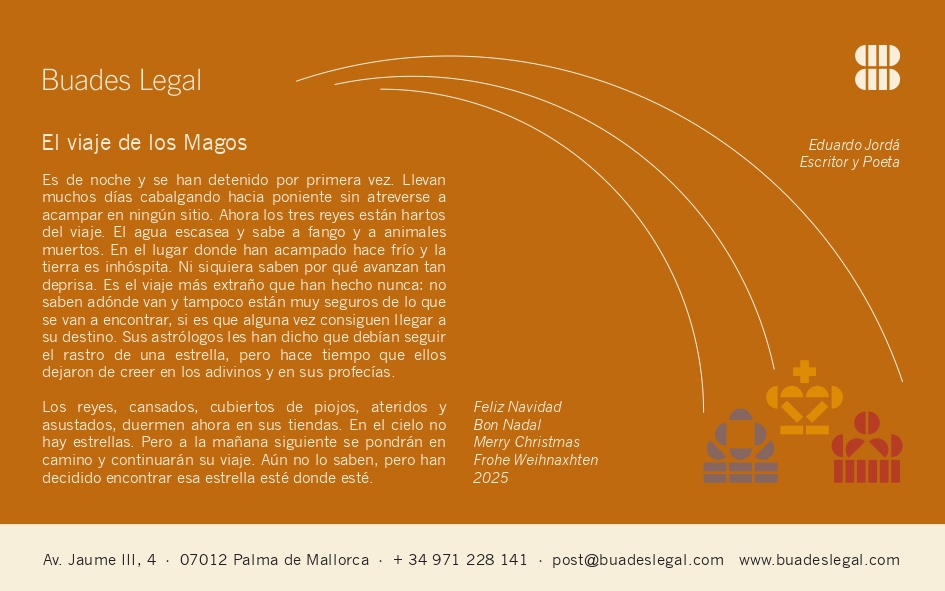
Child theme index:Francisco López: “It is highly gratifying to know that employers rate UIB Law graduates among the best in the country.”
Interview with Francisco López Simó, Professor of Procedural Law and Dean of the Faculty of Law at the University of the Balearic Islands (UIB)
Francisco López Simó succeeded Santiago Cavanillas as Dean of the UIB Faculty of Law in July 2014, since when he has worked vigorously at the head of the 1500 students and 125 lecturers involved in Law and Labour Relations studies on the university’s Palma campus. The Faculty has a large deanery team, which includes the Dean, five Vice Deans and a Secretary.
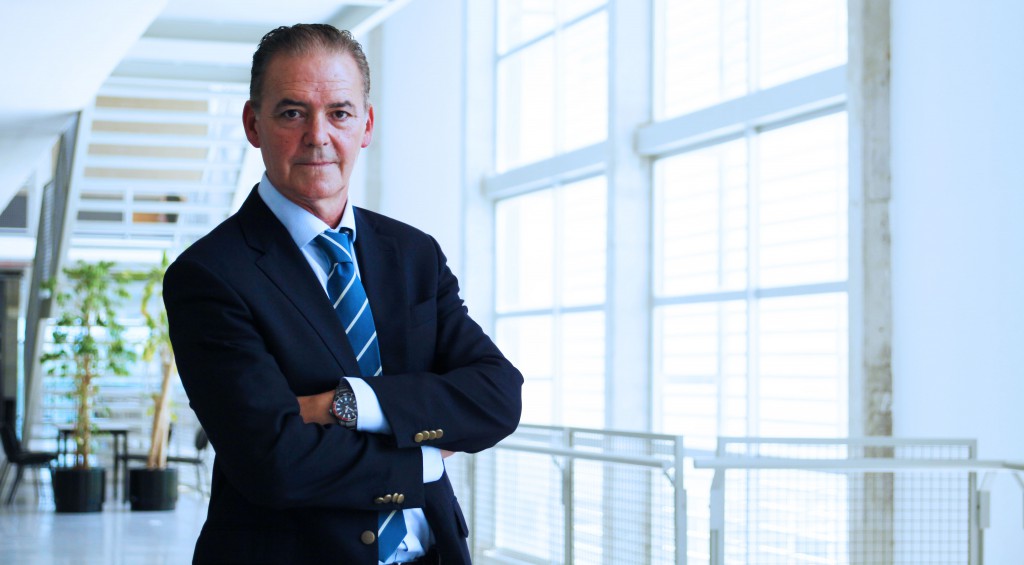
– This month you will have been Dean of the UIB Faculty of Law for two years. What is your appraisal of this period and what challenges do you see for the Faculty in the near future?
-My appraisal is a very positive one. On a personal level, I have been hurled headlong into the unfamiliar and stimulating world of university management. As well as an honour and a privilege, it is an enormous professional challenge to be in charge of the Faculty, striving every day to move forward improvement projects to maintain and raise the university’s high national ranking.
On a wider level, I am satisfied with the work so far, because during my first two years as Head of the Faculty, I’ve been working, the whole deanery team has been working towards the ANECA (National Quality Assessment and Accreditation Agency) accreditation, to bring our new study programmes into line with the requirements of the European Higher Education Area and the Bologna Process. Finally, after a year of really hard, intensive work in 2015, with hundreds of reports, meetings with all the groups involved, assessment visits and so on, we can say that the accreditation process has gone very well, to the extent that we now have preliminary reports indicating that our study programmes —the Degree in Law, Degree in Labour Relations, and the Master’s in the Practice of Law which we run in conjunction with the Balearics Bar Association— comfortably comply with ANECA’s quality assurance standards. It is gratifying to know that ANECA’s assessment is that the Faculty of Law operates splendidly, that our academic offering is of a high standard. Even more gratifying, if that’s possible, is the knowledge that employers rank our graduates among the best in the country, according to the Everis Foundation’s most recent ranking (https://es.fundacioneveris.com/informe_universidad_empresa_2016.pdf). Lecturers, administrative and services staff, students, all have reason to feel very proud of this Faculty!
As for new challenges for the Faculty over the coming years, I have plenty of projects in mind. Creating a judicial oratory chair which will enable us to provide students with adequate training in this crucial skill for any legal professional; promoting the internationalisation of the Faculty by offering more subjects in English; increasing our Erasmus agreements; even setting up a Spanish-German group within the Degree in Law programme. The purpose of all of these proposals is the same: to strive for excellence and ensure that this Faculty of Law is recognised and highly-regarded in Spain as well as overseas. And we can achieve that, we have the resources to do so.
– Which aspects do you think are significantly better for UIB law students today, compared with thirty years ago when you graduated in Law from the UIB?
– A great deal has changed, and, in my opinion, for the better, in the orientation of Law studies at the UIB and Spanish universities in general. The study programme I followed (the 1953 Programme) was a five-year programme, with 25 subjects each year, based on purely theoretical explanations which we had to learn by heart, by swotting. Lengthy law manuals, legislative codes: it was very much memory-based study. Today things are different. Law studies are completed in four years, with 40 subjects each semester, combining theory and practice in approximately a 65:35 ratio. Beginning in the first year, degree students have theoretical and practical classes in all subjects, which allows them to acquire skills and abilities we didn’t acquire in the whole of our time at university: how to draw up a contract, a report, a claim. I would say that, as a result, by the time our students leave university, they are well prepared to enter the professional workforce, in law firms, companies, wherever. On the other hand, they find it harder to cope with public-sector entrance exams, which is logical, because they’re not used to swotting. I believe the whole approach to public sector entrance exams (for appointment of notaries, judges, etc.) should change; it should be appropriate to the education received by students at today’s Faculties of Law.
[roto lado=”left” texto=”The accreditation process has gone very well, as we comfortably comply with ANECA’s quality assurance standards”]
– How prepared do you think Faculty of Law students regard themselves at the end of their studies? Have you noticed any professional concerns among students in relation to, for example, the field of new technologies and Internet law?
-Throughout their degree, students complete a series of surveys that are an indispensable part of UIB’s quality assurance system. At the end of each semester, students answer a satisfaction survey on the subjects they have taken and the lecturers they have had. The survey is conducted anonymously, so that students can answer with complete freedom. At the end of each academic year, they also complete a survey on their general level of satisfaction with the study programme they are following and how the Faculty is organised and operated. Finally, students about to complete their studies in the fourth year complete a survey of around fifty questions related to the skills they should have acquired in the course of their degree, in which we ask them, for example, if they feel capable of drafting a private prosecution or an administrative appeal. And, generally speaking, our students’ responses in all of these surveys indicate a fairly high degree of satisfaction, with lecturers, study programmes, Faculty organisation and level of training receiving a rating of around eight out of ten.
With regard to new technologies, clearly these are having a profound impact in all areas, Law included. Internet is throwing up a lot of new legal issues such as the use of the Internet as a vehicle to commit crime (cybercrime), and the cancellation of personal details supplied to websites (the right to be forgotten). This is a new area of Law which stimulates a lot of interest among the students, because they have been born and raised surrounded by these new technologies, they are part of their daily lives. Conscious of this, we have core subjects (Civil, Penal) within our study programme that tackle these new legal issues. We even have some optional subjects like “Electronic and Internet Commerce”, designed to educate students about these issues on the cutting edge.
– You are a professor of Procedural Law. How would you explain what the subject is about to someone who knew little or nothing about it?
-Very briefly, I would explain that when a legal dispute cannot be settled amicably through negotiation, the only alternative is to apply to the jurisdiction of the courts for a resolution of the conflict through legal proceedings. Procedural law is, basically, the discipline that explains all of that: the jurisdiction, the process, and the rights and obligations of those involved.
I would also say, from the impassioned point of view of someone who dedicates his life to it, that I consider it a very important subject, indispensable for anyone involved in the practice of the law. You cannot be a good lawyer, procurator, judge or public prosecutor without mastering procedural law! And I think that students also perceive, very early on in their degree, that it is one of the lynchpins of their legal education.
– With Spain a member of the EU, European law is increasingly setting the legislative agenda. In your opinion, how much coherent coordination exists between European and Spanish regulations? In which direction should we be heading?
-European law (the treaties, rules, directives) is an integral part of the legislative system of the member states. Those member states are primarily responsible for its correct application, and they must also, where necessary, transpose EU directives into their own nation’s law within a stipulated period. Sadly, some states —and ours is one of them— quite often fail to meet this commitment, repeatedly violating EU legislation. The EU has had to give us a slap on the wrist on numerous occasions: the “health centime”, the Parot Doctrine, aid to Spanish steelworkers and football clubs, the European Health Insurance Card, and so on. This is not the way to proceed. If you want to be a member of a club, you have to accept and comply with all its rules!
I am a staunch defender of the EU, of European integration, because Europe guarantees, not only the single market economy, but also freedom, democracy and security. Right now with so much talk and concern about the United Kingdom’s Brexit, we want the process of building Europe to be irreversible. We must continue moving forward, in political, economic and social union as well as in legislative union. More Europe, and more European law!
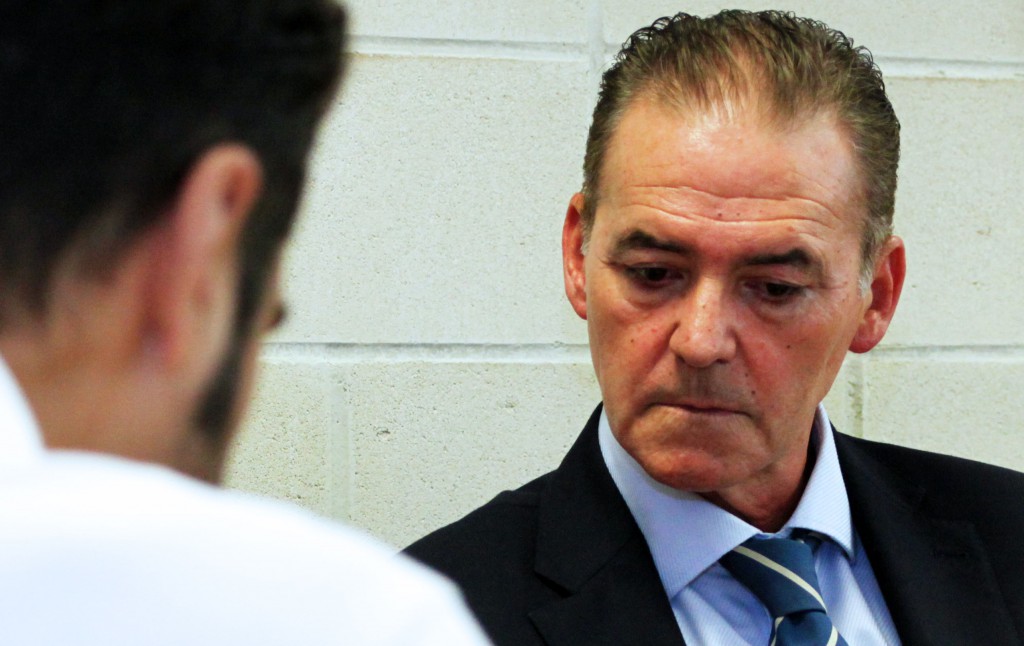
– What kind of relationship do you have, or have had, with Bufete Buades?
[roto lado=”right” texto=”We must continue moving forward, in political, economic and social union as well as in legislative union. More Europe, and more European law!”]
-Although I had heard a lot about him previously, I met Mr. Joan Buades personally at a postgraduate course on the new Criminal Procedure Act organised by Dr. Isabel Tapia and myself, which took place in Palma in the autumn of the year 2000. Mr. Buades took part as a speaker. I saw immediately that his professional background was very interesting, that he could be a good “signing” to the Faculty. And the opportunity arose during the 2001/2002 academic year, when I was Vice Dean of Academic Governance. The Faculty was implementing the so-called 1997 programme, a UIB Degree in Law study programme that was somewhere between the old 1953 programme and the current Bologna programme. An important part of the programme was the Practicum, a course taken by students in the second semester of the fifth year. The course was entirely practical, so we thought it should be run by practising legal professionals such as lawyers, judges and prosecutors. Mr. Buades was awarded one of the nine Associate Lecturer places we offered for the course. He was an Associate Lecturer on the Practicum course —specifically, in Court Practicum, lecturing in Civil Procedure Practice— until 2009. Subsequently, with the current Degree study programme, he became —and still is— a lecturer in the Department of Private Law, collaborating in the teaching of the fourth year subject option “Alternative means of conflict resolution”, a field in which he is highly specialised. In recent years he has also given a seminar on Company Arbitration and Bankruptcy Mediation to students of the Master’s in Advocacy, run by the UIB in conjunction with the Balearics Bar Association (ICAIB). So, in spite of his multiple commitments, Mr. Buades has been collaborating with us in teaching tasks for many years now, for which we are very grateful. It is very necessary, indeed essential, that the Faculty includes successful professional lawyers among its team of lecturers. No one is better qualified to offer students that practical vision of the law that the Bologna programme aims to promote.
As for his law firm, Bufete Buades, I don’t think I’m giving anything away if I say that it’s among the most important “local” law firms in the Balearic Islands, both for the number of cases it handles and the number of lawyers working there —some of whom, incidentally, were former students, good students, of this Faculty. Several of the firm’s lawyers have followed in the wake of Mr. Buades and got involved in university lecturing: Carlos de la Mata, Lorenzo Salva and Miguel Reus have all joined the Faculty as Associate Lecturers.
To sum up, my relationship, this Faculty’s relationship with Bufete Buades is a longstanding and fruitful one, in the academic sense. As I’ve just explained, the firm is —if you’ll forgive the expression— a good pool of Associate Lecturers for the UIB. And I hope it will continue to be so.
– There has been no shortage of major cases being tried in Balearic courtrooms in recent years. From your experience as a judge, and purely from a technical point of view, what is your opinion of the conduct of the Nóos case trial, one of the most, if not the most closely followed by the media in recent Spanish history?
-We could be talking for hours, for days, about the investigation and trial of the Nóos case. There is enough material there to fill several doctoral theses in penal and procedural law: the charges made and dropped against the Spanish Infanta during the investigation phase; the attempt on the part of Iñaki Urdangarín’s defence and the Anti-Corruption Prosecutor to remove Judge Castro from the case and have it tried instead by the Valencia Supreme Court of Justice; the Prosecutor’s attempt to accuse [and therefore disqualify] the lawyer representing Manos Limpias, the only party bringing a charge against the Infanta; the “procedural crossfire” exchanged between judge and prosecutor. All this, and much more, went on for no less than five and a half years of investigation and six months of public hearings, with six charges, eighteen defendants and more than 300 witnesses. From the start of this “macro-trial” to the sentencing, more than six years will have gone by. And it won’t end there, for the sentence will surely be appealed by one or other of the parties. In other words, the judicial response will come, but it will be a long, long time coming. Slow justice is still justice, I think, but less so.
We don’t have the time here to go into these and many other fascinating aspects of the case, but I feel one thing must be emphasised above all. The trial of the Nóos case has shown that, despite assertions to the contrary, all citizens are equal before the law. In the end, Cristina de Borbón, sister of the King and Spanish Infanta, had to sit in the dock; she was not spared that shame by the Baleares Provincial Court, which ruled not to apply the so-called Botín Doctrine. It remains to be seen what judgement the court will hand down, whether or not the Infanta will be convicted of cooperating in her husband’s tax fraud. Whatever the result, I think it is important to point out the extraordinary professionalism, independence and impartiality shown throughout the public hearing by examining magistrates Samantha Romero, Eleonor Moyá and Rocío Martín (incidentally, Romero is a former student and Moyá a former associate professor of this Faculty). One of the positive outcomes of the Nóos case is that, on this occasion, the judicial system has functioned correctly.
– In recent weeks there has been a lot of talk about the latest reform of the Criminal Procedure Act and its attendant issues, which public prosecutors warn will result in a huge number of cases being dismissed. What do you think of this reform, which came into force on 6 December 2015?
-The 2015 criminal procedural reform is the nth “patch-up” reform of our ancient Criminal Procedure Act of 1882, and, in my opinion, it should be viewed in a positive light overall. This latest reform introduces important new criminal justice measures to aid expedition and investigation (regulation covering technological investigation, both necessary and urgent since the Criminal Procedure Act up to now only included the interception of postal, telegraphic and telephone communications) and strengthen procedural guarantees (substitution of the term “accused” with “under investigation”, generalisation of the second instance in criminal cases, establishment of a review mechanism for sentences handed down by the European Court of Human Rights, and reinforcement of the right of defence in all stages of the penal process).
New measures introduced by the 2015 reform to expedite criminal justice and avoid needless delays in proceedings include modification of the rules on criminal connections, in order to avoid an increase in huge-scale “macro-cases”; no police statements relating to “unknown perpetrator” crimes are to be referred to the courts and the prosecution service; and the regulation of a new proceeding known as “acceptance by Decree” of the Public Prosecutor, which aims to provide a very rapid punitive response to minor offences. Doubtless the most significant measure, and the one to have attracted most media attention, is the setting of maximum terms for the investigation phase. The investigation phase of a criminal proceeding is limited to six months for straightforward cases and eighteen months for complex cases, terms which the legislator of the 2015 reform defines as “realistic” and “reliable”.
Prosecutors’ associations have warned of the risk of impunity inferred by these maximum terms. However, this doesn’t seem to me to be a very significant risk in reality. The 2015 reform has established a fairly extensive list of circumstances under which the investigation can be considered “complex” and therefore in practice it will be fairly common for an investigation that hits a problem and needs more time to be declared complex and so be permitted to run to a maximum of 18 months. That term may also be extended, for an equal or shorter term, at the petition of the Prosecutor, and in exceptional circumstances may even be extended again, at the petition of both the Prosecutor and the other participating parties, provided there are sufficient grounds to do so. And that’s not all: all of the terms mentioned are suspended for as long as proceedings are carried out in secrecy, or when a temporary stay of proceedings is agreed (new wording of Article 324 of the Criminal Procedure Act). The reality, therefore, is not an insurmountable and relatively short time boundary, but a flexible one that can run to as much as 36 months, three years!
– When you’re not expanding your knowledge of the law, what other kinds of books do you like to pass the time with?
-I like historical novels very much (Robert Graves, Pérez Galdos, Hugh Thomas, Santiago Posteguillo, Ken Follett), especially ones set in the Egypt of the Pharaohs (Christian Jacq, Terenci Moix). Then, biased by my profession, obviously, I also like fiction with a legal theme (John Grisham, Scott Turow, Robert Traver, Harper Lee, Borja Martínez-Echevarría).
However, reading is not what most entertains me in my free time these days, I suppose that’s an unconscious reaction to my work, which obliges me to read for so many hours every day. At weekends and on holidays, my favourite pastime is sport, mostly tennis and padel. I’m a tennis fan, I’ve been passionate about it since childhood and I take it up again in the summer holidays. I go into training and enter some veteran’s competition or other: I love the adrenalin of competition. Naturally I’m a big fan of our Rafa Nadal, I follow him on television and in action whenever I can. It would be fantastic to see him bite his tenth Musketeers Cup in Paris.
I also love travelling, getting away with just my wife or together with our children or friends. For me, it’s the best way to break with routine and really unwind. Mallorca is a wonderful place to live, but the world is far too beautiful to just stay at home and never get to see it!
Majorca is a paradise – if you can stand it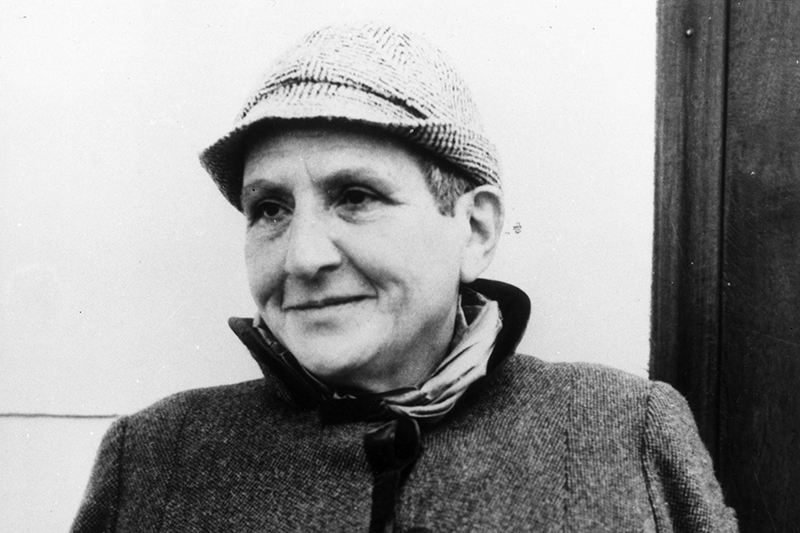
As part of our ongoing project Nos queda la palabra (in English, “The words remain”), we recently published a photograph of Gertrude Stein, accompanied by the phrase, “Majorca is a paradise – if you can stand it”.
Since this quote has struck some people as a curious choice as well as being a complete departure from the law and judiciary-themed quotes that preceded it, I felt some kind of explanation was called for.
The enigmatic words belong to Gertrude Stein, an American novelist who was born in the last third of the 19th century. She moved to Paris in 1903, living in Europe, specifically France, until her death in the middle of the last century. Stein became a cult figure, an influential trend-setter who actively promoted and encouraged contemporary art, and the Stein salon became the most sought-after gathering place for the cosmopolitan Paris intelligentsia. Director Woody Allen pays tribute to it in his film Midnight in Paris, in the memorable dialogue between Gertrude (magnificently played by Kathy Bates) and a timorous Pablo Picasso (characterized by the Franco-Argentine actor Marcial Di Fonzo Bo).
The story goes that the British writer Robert Graves, after writing the novel Goodbye to All That, an autobiography of the first part of his life, had made up his mind to leave England and visited the American at her home in Paris to ask her what she thought of the several options for a permanent home that he was considering at the time: Switzerland, South of France, North Africa and Majorca. In the course of the conversation, Stein uttered the cryptic phrase. Graves heeded her words and moved to Majorca, where he lived in Deià for almost half a century until his death.
Gertrude Stein and her life partner Alice B. Toklas had visited Majorca on two occasions: the first time before the outbreak of the Great War, in the summer of 1914; and the second, in the middle of the war, in 1916, when they were received by the painter William Cook and stayed for more than six months in El Terreno, a tiny village or llogaret near Palma, which was much favoured by artists, creators, bohemians and inveterate travellers. They both liked Majorca, hence Stein’s now famous reply to Graves’s question.
But what is the meaning behind her enigmatic words? The most plausible explanation is that, though Majorca was a physically idyllic location, its lifestyle – provincial, unsophisticated, village-like, slow and narrow – would be enough to dissuade anyone from making a permanent home on the island. Also worth a mention in this connection is the novelist George Sand, whose scathing criticisms in her well-known travel novel A Winter in Majorca portrayed the people of Majorca in a very unflattering light.
That said, imagination is free: let anyone make of the remark what they will.
For my part, I prefer to take it quite literally and state that yes, Majorca is a paradise, if those of us who live in it make the unwavering commitment to do everything we can to see that it remains so; and, frankly, given the times we live in, we have no easy task ahead of us.
So, to bring that superlative definition up to date, we could say, “Majorca will remain a paradise if we commit to keeping it that way”.
These were the reflections behind the choice of the famous remark by Gertrude Stein, whom we thank for the affection she showed to Majorca.
Joan Buades, Director of Bufete Buades.
Xisco Jiménez: “The discovery was amazing and highly emotional because we had the good fortune to experience it directly”Interview with Xisco Jiménez, the Mallorca astrophysicist who took part in the detection of gravitational waves
Xisco Jiménez is a physicist and member of the Relativity and Gravitation Group at the University of the Balearic Islands, the only group in Spain affiliated to the LIGA and GEO international collaboration projects involving 1,000 scientists from fifteen countries. This observatory’s mission is the detection of a phenomenon suggested by Einstein, that of gravitational waves.
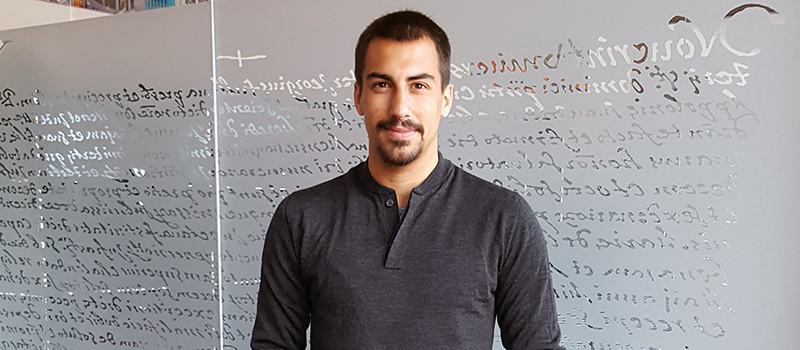
– How does it feel to have contributed to one of the biggest scientific discoveries of the year, the detection of the gravitational waves theorized by Einstein exactly a hundred years ago?
– It was amazing and highly emotional, especially for us as the youngest researchers who are new recruits to the field of science but had the good fortune to experience it directly. I say that because many people worked on this project, but for us, who practically just happened to be there, we found we had won the lottery just a few years after starting out. We had direct information available to us because my thesis colleague was right there where the detectors are located and was able to see what was happening in real time on the big screens. Imagine it, to experience such elation and then, for various bureaucratic reasons and confidentiality commitments, not be able to share the discovery beyond the team members. Fortunately we were in contact and were able to discover it almost instantaneously, first-hand.
– Imagine you are in front of a class of 10 to 12 year-olds. How would you explain this phenomenon so that they could understand it?
– As you know, the scientific article talks of two black holes colliding and disturbing that strange something that is spacetime. This begins to vibrate and it is then that these vibrations reach us. But that’s too complex and technical. So to put it into real, everyday terms, imagine you are standing in front of a lake that is absolutely smooth, still and stable, and you throw a stone into it. Imagine you’re blind as well and that you’re standing with your feet on the bank, then you would observe that something was happening in that smooth lake because you would begin to notice oscillations in the water caused by the impact of the stone. So if, instead of a small stone, you start to throw bigger and bigger stones, those waves or disturbances would be bigger and bigger and therefore the impact you would feel would be much greater.
So the analogy would be this: we need objects that are truly massive and very compact, like black holes (the stones), in order to make space (the lake) vibrate. What these holes do is move the points of space, causing them to vibrate, and with them ourselves and everything else contained in space.
– Right now you are immersed in your doctoral thesis, based on the study of gravitational waves. Tell us a little about where you’re at with that and what you still have left to do.
– The thesis is in its final stages now. I am currently in the writing stage and I hope to defend the thesis by the end of December. Evidently all this new material that has appeared since last September, since this discovery, that is, is going to be very useful, to make the thesis more attractive, at least. Future projects? We will try to carry on researching. For the sake of the health of science, that will probably take place outside Spain; also because the possibilities are limited here. It’s not easy for young researchers to work in this country.
– How is a project as big as this coordinated at the UIB through your research group?
– How do you coordinate a programme on such a large scale? Well, imagine how discussions arise in a family of four, five or six people: it’s no different in a large community of researchers. But the fact of having these different visions from such different countries and from so many people bringing different ideas to the table is what makes this type of project successful. In fact, this collaboration actually began as an exclusively American project between the Massachusetts Institute of Technology and the California Institute of Technology (Caltech). But they quickly realized they needed the input of minds from other continents and went beyond the American continent in order to bring about a vastly increased development of pure science and theory.
– The UIB has a very good reputation internationally in certain fields of scientific investigation. What do you think of the work being done in the different subject areas, and in particular in the field of physics?
– I think it is a university categorized with a seal of excellence, on the official level. Unofficially speaking, clearly there is always room for improvement. In other words, we are a small faculty, we don’t have many students, that much is true, but if I had a complaint it would be about the lack of interdisciplinarity that exists among the physicists, the scant contact that exists between adjacent offices. And how this reality may be projected in exhibitions of work to the general public, something which is of equal benefit to all. The most obvious example is in the lack of interconnection that I, as an astrophysicist and physicist in the Physics department, have with the Constitx observatory, that’s to say, there is practically no contact. It looks as if some new ideas are currently being handed down, but until now there has been no coherent, continuous collaboration with this observatory that we have here, and it is something that students could greatly benefit from.
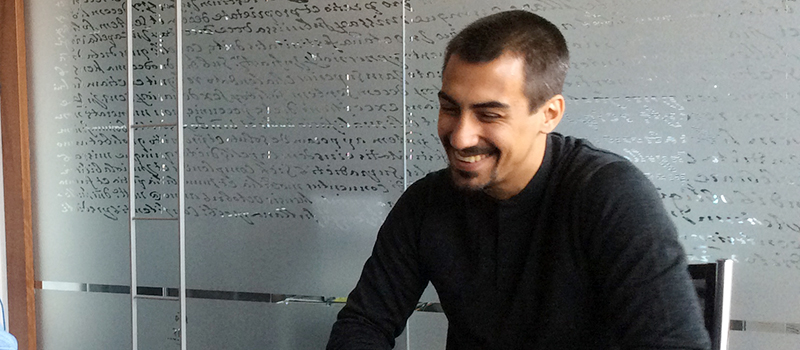
– When did you know that you wanted to be a physics researcher?
– I knew from when I was a small boy. I knew then that I really enjoyed observing the sky and the stars, but I enjoyed it like any kid who likes to play at being a scientist, all the while getting more and more curious about the night sky. Then, as the years went by, I got other ideas, until I ended up studying Physics because of that old, somewhat bucolic idea of the boy who wants to be an astronaut or an astrophysicist. Then I said to myself, why not? When I started the first year of my degree I came across teachers with genuine expertise who were really interesting from a scientific point of view, and that confirmed my expectations.
– How do you think your passion for science has influenced your life? Do you think you have had to sacrifice social life because of your dedication to science or has it instead given you the opportunity to meet fascinating people and create new friendships?
– Personally, I’ve always been ranting because I saw that in other degrees the work programme seemed to be totally different to mine. But I certainly didn’t miss out when it came to the partying, let’s put it like that, so socially I haven’t been limited in any way, though it is true that the mechanics of the work were genuinely different to that of other fields of study where people tended to do things almost at the last minute, whereas my work needed to be followed continuously throughout the academic year. It is also true that this degree has enabled me to meet really respected scientists and some amazing characters. Above all, it gave me the opportunity to travel to congresses and get to meet many of those scientists with pages on Wikipedia packed with information. Having the opportunity to ask Roger Penrose or Stephen Hawking a question in person is a priceless experience. You have the photo, at least.
– What is your relationship with Bufete Buades?
– My relationship with Bufete Buades is one of friendship verging on family because of the direct link with my aunt and uncle, who are long-standing personal friends of Joan and Teresa. This has meant that I have met up with their son, Biel, on many occasions, and we have played together since we were small. It’s a friendly relationship.
– When you get away from the waves, what do you do with your free time?
– I love football and I’ve played nearly all my life. When I’ve tried to give it up, football hasn’t wanted to give me up. It’s a love-hate relationship and I’m still involved in it. Sport is my second passion – as a fan, obviously. Right now I play in the Third Division for Playas de Calvià. Sport is necessary. The experience you gain from your other competitive side, from another professional aspect, is invaluable, and the sum of the two parts is always a bonus.
– Where do you see yourself going professionally after you finish your doctoral thesis linked to gravitational waves?
– To answer that quickly, I would say with a post-doctoral stay, which are usually one, two or three years long, and abroad, if I’m lucky. Outside Spain they don’t seem so hard to come by as they are here. After that, I don’t know but I don’t rule anything out. Even a change of field is appealing, I mean, not working in pure science but trying to move into one of the many branches with a greater application in the corporate world. I have friends working in financial and consultancy companies, for instance. Of course, I would like to be able to develop my professional activity in teaching, but I can’t look further ahead than the next two or three years, or even one year.

Your refrigerator is never out of…
Water.
To achieve maximum concentration, you usually practise…
Sport.
Your favourite Mallorca dish and who makes it best
Definitely Arròs brut (Mallorca-style risotto with wild mushrooms and game), and I have to name two chefs: my mother Amelia and my aunt Mercedes.
The image that best encapsulates happiness in your childhood
That would probably be on a football field, celebrating a win.
A historical figure you would have liked to meet and why
I would like to have met Albert Einstein, but away from a scientific context, probably with a guitar and three beers too many, having a conversation that wasn’t all about science but about other aspects of life.
The quality you most admire in a person
Courage.
Xisco Jiménez is never away from…
His friends.
A place you would like to escape to for a time
If I had to go somewhere really extreme, I would go to India to work for a year, for example. Nearer home, who knows, I would go to any country…
2nd Diario LA LEY Readers Prize goes to Mateo Juan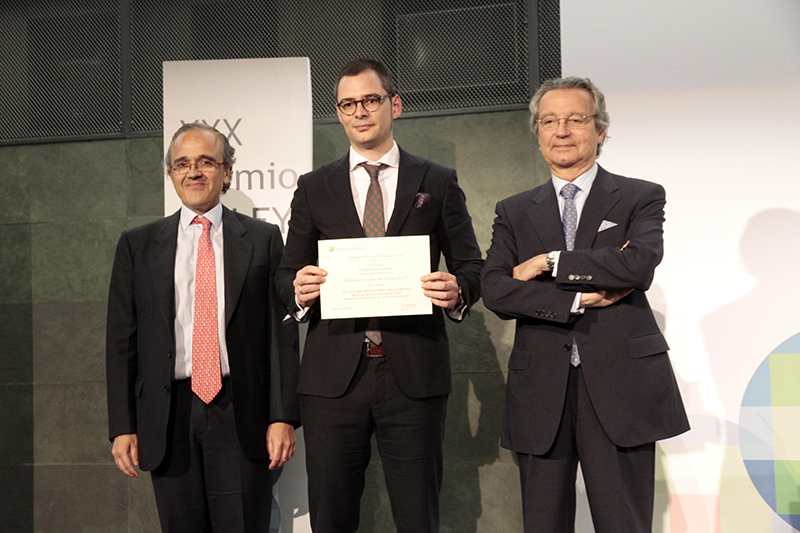
Bufete Buades has reason to celebrate once again as the firm’s work is recognised at national level for the second time in recent months. Bufete Buades won the award for the Best Legal Marketing Strategy in the 2016 Legal Marcom awards earlier this year. Now the merit goes to our lawyer, Mateo Juan Gómez, who has won a national prize awarded by Diario LA LEY, Wolters Kluwer’s prestigious legal publication, for the legal article most consulted by readers of the daily newspaper.
The article, “10 things you should know about the reform of the Civil Procedure Code”, was among the five finalists in the first phase of the competition and, after being submitted for the consideration of the LA LEY Instructional Articles panel of judges, was judged the best in terms of the three criteria of quality, topicality and interest.
Here is how Diario LA LEY reported it on its website:
Readers of Diario LA LEY have recognized the article "10 things you should know about the reform of the Civil Procedure Code" in the most-read article of 2015 category. The article's author is Mateo Juan Gómez of the Bufete Buades firm.The Spanish Legal & Regulatory division of Wolters Kluwer, a leading global company in management solutions and information, training and professional software services, has announced the winner of the 2nd Diario LA LEY Readers Prize. The award goes to the article “10 things you should know about the reform of the Civil Procedure Code”, by Mateo Juan Gómez of the Bufete Buades firm. The award will be presented on Thursday 26 May during the 30th Edition of the Diario LA LEY Instructional Articles Awards ceremony.
Award-winning work
The article was published in the 4 December 2015 edition of the newspaper. The direct, complicit, lawyer-to-lawyer language used by the author to sum up the procedural reform enabled the article to become a source of guidance and analysis for the reading of the reform for readers of Diario LA LEY.
About Diario LA LEY Readers Prize
All the articles published during the year are considered for the Diario LA LEY Readers Prize. Each month, the three most-read articles are selected. At the end of the year in question, the five most-consulted articles are submitted for the consideration of the LA LEY Instructional Articles panel of judges. The judges then select the article which, in their view, best fulfils the specifications of quality, topicality and interest.
Read the complete article: "10 things you should know about the reform of the Civil Procedure Code".Bufete Buades at The Mallorca Real Estate Day
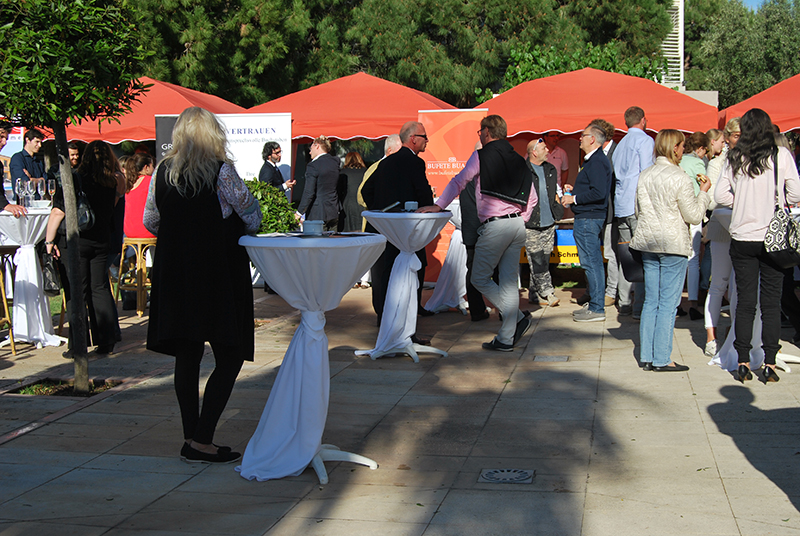
The Mallorca Real Estate Day event took place at Mallorca’s Club Diario on 13 May, 2016, and was a huge success in terms of attendance. The event’s focus was to shed light on property-related problems from the point of view of German-speaking property owners in particular.
The programme included several speakers and a number of exhibition stands situated outside, where large numbers of visitors were able to interact with representatives of specialist companies in the field, among them Bufete Buades.
First on the agenda was a guided tour of the Conference Centre, then it was the turn of the speakers. Mr Willi Plattes gave a talk on tax issues related to rental properties, in Spain and in Germany, under the Spanish Urban Lettings Act and the tax on stays in tourist establishments. Mr Micheel Wassouf then talked about the energy efficiency measures available to home owners, while Professor Heribert Heckschen, a German public notary, gave a talk on the problematic area of inheritance and probate law applicable to German nationals with property in Spain. The final speaker, Ms Alexandra Wilms, press secretary for the Regional Ministry for Tourism, described the state of tourism and tourist accommodation today.
The day’s activities were rounded off with a cocktail, allowing visitors the chance to share their impressions and explore the issues raised during the event in greater detail.
Albert Pinya: “In art, intuition is more important than reason”Interview with Albert Pinya, Majorcan artist and “creative humanist”.
The name Albert Pinya is synonymous with success. Born in Palma, Mallorca, in 1985, Pinya is one of Mallorca’s most active artists young, alert, polite, and extremely charming. Generally speaking, his work draws on an intentional, ironic naivety with which he manages to dismantle the perverse structures of reality. He has rapidly developed an identifiable signature style, incorporating codes from popular culture, comic books, illustration and a meditated naive aesthetic that conceals a precise treatment of the themes he explores. Pinya defines himself as a “creative humanist” because the focus of his obsession is the study of how human beings relate and connect to their surroundings.
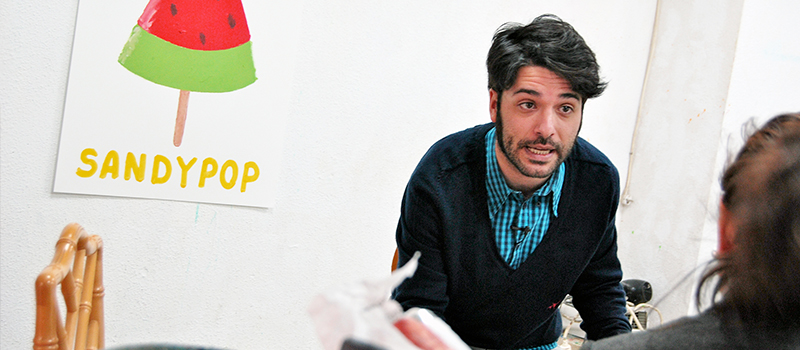
Albert, what inspires you?
Everything that is part of life inspires me. Obviously, some themes are more recurrent than others the interest in “agro-power”, for example, the ultra-local dimension, and poetry, always poetry. I particularly like those influences that refer us back to our ancestry and back to the land, those that come from peripheral cultures and rural life. Today, it seems to me that they provide some of the most valid responses to today’s modern societies – victims of excess and abuse of new technologies – not just in the pictorial sense, but as a question of personal attitude. That’s why I reclaim the ancestral nature of things. Curiously, in some sectors of the art world, certain lobbies are set on the idea of -destroying” or “murdering” painting, saying, “Painters should be in archaeological or prehistoric museums” or, “Painting is an anachronism”, or that contemporary artists today have to be video-artists or digital photographers or transvestites… There’s a lot of stupidity out there, we know that. Technological art casts no shadow. And we live in a world in which everything has shadows and ghosts. And I don’t intend to abandon them.
Could it be said that the message of your work is to reflect on where human beings come from?
One of my obsessions focuses on observation and on the study of how human beings relate and connect to their surroundings. Though I must admit I tend to be more interested in how human begins function socially rather than individually. I am constantly looking for answers to the diverse conflicts that surround us. And I think that should be one of the basic functions of the contemporary artist. The insatiable capacity to challenge and reevaluate existence, history and, for that matter, life itself. Or as Sanchez-Castillo would say, “And what is the role of the artist? To demonstrate contradiction. That crack through which a doubt is created.” Amen.
Your work received an ARCO [International Contemporary Art Fair] award. What did winning the award mean to you?
Well, to be honest, when I received the award, I didn’t know it existed. The repercussions were huge and I understood that it was an important recognition. In any case, awards are somewhat anecdotal. It’s the trajectories that are important.
Why do you think people criticise some of the works presented at art fairs like ARCO?
I think one of the big problems, apart from the voracious ignorance that exists, in Spain above all, is that the public professes to want to understand everything it sees. And an emotion cannot be rationalised. In art, intuition is more important than reason. As in poetry.
Have you ever been afraid to make a mistake?
Error and failure are part of the creative process. If you don’t make mistakes, you don’t learn. If you don’t take risks, you don’t win.
What is your relationship with Joan Buades?
Joan is passionate about contemporary art and that is the principal bond between us. I like him because he is a person with a great sense of humour, which is a quality I value above many others. It is fundamental. At my age, I could be his son, but I feel sure that, if we were closer in age, we would be accomplices in many other things.
What are you working on at the moment and what are your projects?
I finished 2015 exhausted from the maximum effort that went into four individual exhibitions during the year. At the Allegra Ravizza gallery (Lugano, Switzerland), the Cervantes Institute in Berlin and Milan, and also an artist’s book in collaboration with the poet Ángel Terrón, edited by Edicions 6a Obra Gráfica of Palma de Mallorca. Of the projects I-m currently working on, two” stand out. The first is a project based on the “Tots els sepulcres” [All the sepulchers”] trilogy by the poet Jaume C. Pons Alorda, which will culminate in an exhibition as part of the Leselenz Poetry Festival in the city of Hausach in Germany next June. The poet himself will curate the exhibition along with the festival curator, José F. A. Oliver. On the other hand, in parallel with this show, the poet Jaume Manur and I are involved in an editorial project that deals with fauna and the different species indigenous to Mallorca, in another attempt to connect poetry, painting and, very importantly, teaching units that can be used in schools.
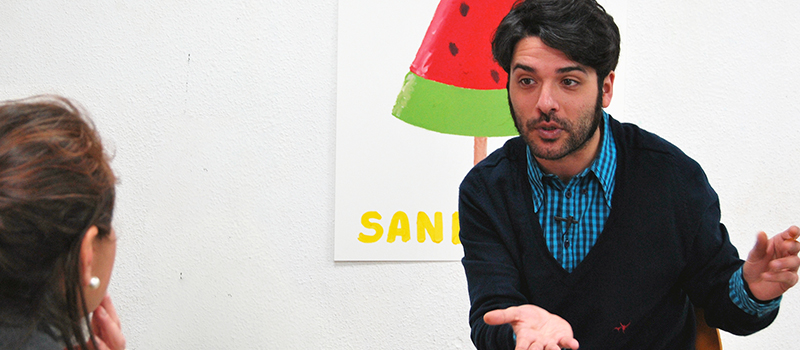
And how do you prepare for all this?
Just like any person in my situation. By staying focused, being very alert, having patience and also, mainly, a lot of dedication and persistence. Art = Life
How do you see yourself over the next five years?
I can’t tell you, I’m afraid. Things live in me, not in time. And in me, everything is present.

A regenerative activity after a long, hard day’s work
Caresses, hugs and kisses.
Your favourite Mallorcan dish and the person that does it best
“Cheeks of black pork” made by the chef María Solivellas.
A drink your home can never be without
Laccao [a Mallorcan brand of chocolate milkshake].
The image that best embodies happiness in your childhood
The Boomer chewing gum that my father would buy me every Saturday afternoon at the village shop.
A historical figure you would have liked to meet and why
Dracula. Because he is like painting. He dies and comes back to life.
The quality you most admire in a person
Enthusiasm.
Albert Pinyas is never far away from…
His fascination with Twin Peaks.
“Nos queda la palabra”, a learning experience for us allFor a project to achieve recognition at national level is a great morale boost and a clear indication that things are being done right. Bufete Buades has invited us to share our experience of how the ‘Nos queda la palabra‘ initiative evolved to become the winner of the Best Legal Marketing Campaign in Spain at the first edition of the Legal MARCOM awards in 2016, among law firms inside their category.
The story begins in June 2015 when Pau Nadal, Project Director at C3PO, told us that the firm was looking to initiate a creative campaign with a different design approach that would break with the traditionally sombre image of the legal world. At that precise moment, one of the office computers was playing Paco Ibáñez’s musical interpretation of Blas de Otero’s poem, ‘Me queda la palabra’ (in English, ‘The words remain’). Minutes later, inspiration fired the collective imagination of our creative team, who decided there and then to devise a strategy that focused on language as the central element of the dialogistic nature of the lawyer figure, and as the honourable expression of his or her professional judgment.
Here is the poem:
If I have lost my life, my time, all
that I tossed, like a ring, into the water,
if I have lost my voice among the mass of entangled weeds,
the words remain.
If I have suffered thirst, hunger, all
that was mine and turned out to be nothing,
if I have scythed the shadows in silence,
the words remain.
If I opened my lips to see the face,
pure and terrible, of my homeland,
if I opened my lips till they were torn to shreds,
the words remain.
After reading it, listening to it and reading it over and over again, we got in touch with Bufete Buades to propose the idea. The firm’s legal team gave one hundred per cent commitment in their feedback and their team effort, helping us to fill out our proposal and explore future adaptations of a campaign whose intention was to highlight the power of language as an essential mechanism for social harmony in a state governed by rule of law.

So then, with the collaboration of all the firm’s lawyers, we studied the possibility of putting together a series of reflections by key historical figures which uphold the value of dialogue and freedom of expression as essential elements in the progress of civilisation. We aimed to bring these to life in high-impact graphic advertising pieces via their respective channels. All the lawyers contributed suggestions until we had assembled dozens of representative quotes worthy of spotlighting. Once the pieces were designed and released, we very quickly noticed that the campaign was proving exceptionally popular, with the firm beginning to receive favourable comments and reviews congratulating it on the launch of the initiative.
At that point, we decided to take the project a step further and increase its visibility by creating its own website: www.nosquedalapalabra.es. Because the firm was keen to involve its lawyers as much as possible, we shot some short audio-visual clips, many of which used an interview-dialogue format, to record the advocates’ thoughts on diverse aspects of their respective practice areas. One more demonstration of the firm’s commitment to bring accessibility, modernity and originality to the legal tradition in the present-day legislative process.
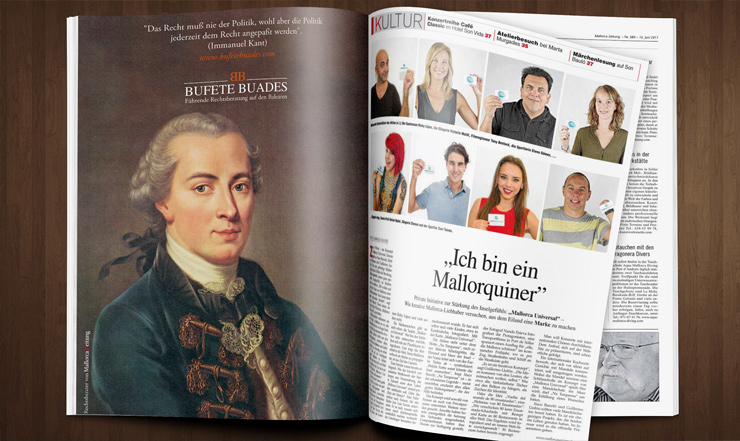
Developing this campaign has been a rewarding experience for C3PO USAL AFUERZA, for the recognition it has received at national level within the sector, and for the satisfaction derived from having worked in and as a team. Just as for Bufete Buades, the power of language and the weight of argument are key elements of our work, and playing with language, both visual and textual, is a day-to-day challenge in our work.
Finally, we would like to congratulate Bufete Buades on its firm and constant commitment to situate concepts such as ‘renovation’ and ‘innovation’ in all their endeavours, introducing these especially into the DNA of their communications processes. For us, the project was a real challenge and a continuous learning curve, during which we worked hand in hand with the firm’s management team, headed by Joan Buades, whom we wish to thank. We also wish to thank the legal and administrative teams for their ongoing willingness to accept guidance and advice, and to acknowledge the involvement of the entire firm in every one of the proposed internal and external initiatives.
Bufete Buades, as part of the ‘Nos queda la palabra’ (‘The words remain’) initiative, joined forces with RSM Spain to hold a seminar on Compliance, ‘When management is held criminally accountable for employee offences’, with the aim of helping to resolve concerns in this area.
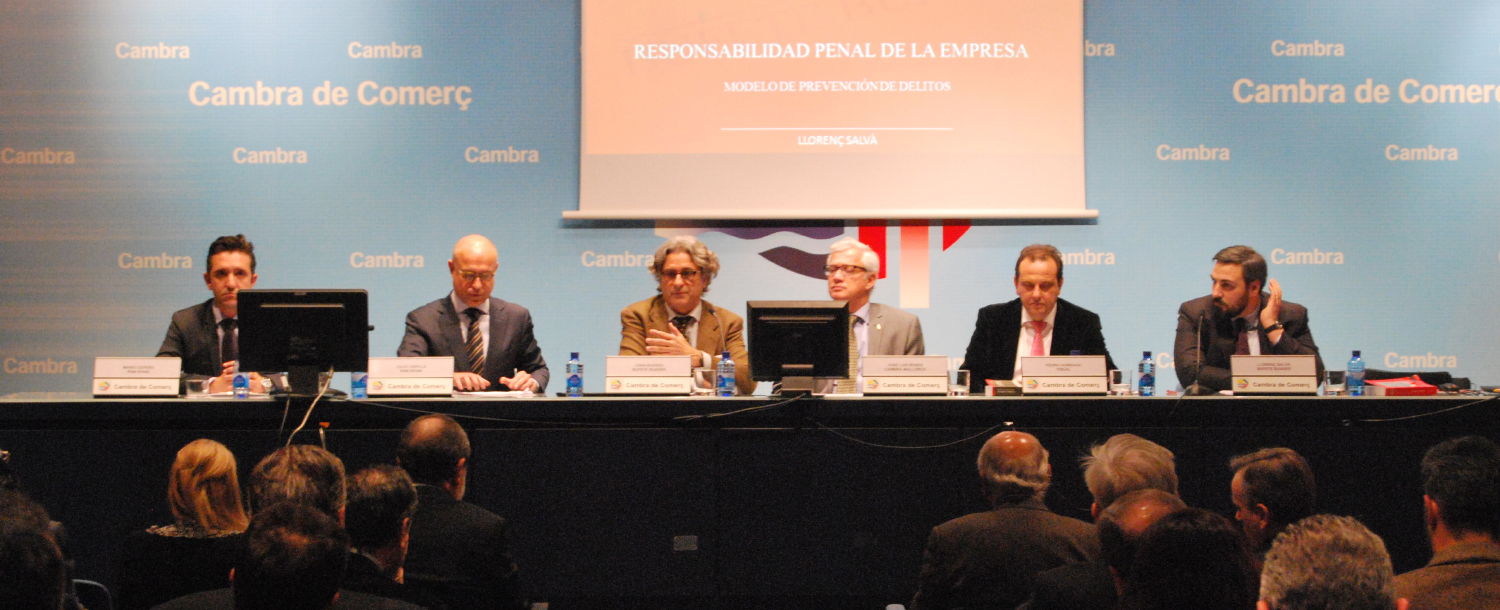
A press conference preceded the event, which opened with presentations by Joan Buades, Managing Partner of Bufete Buades; Pedro Horrach, the Balearic Islands Anti-Corruption Prosecutor; Llorenç Salvà, criminal lawyer at Bufete Buades; Julio Capilla, Managing Partner of RSM Spain; and Mario Cepero, partner at RSM Spain.
Joan Buades explained, ‘Those of us that work as consultants to businesses must be aware that this criminalisation affects political parties, trade unions and other organisations as well as limited companies and public limited companies.’ The Chairman of Bufete Buades thanked the public prosecutor, Pedro Horrach, for making time in his busy schedule, and José Luis Roses, President of the Chamber of Commerce, for his active involvement in the impeccable organisation of the event.
Buades continued, ‘It is vital that companies create a culture of regulatory compliance by implementing accountability measures to prevent their employees from committing crimes wherever possible. In the end it comes down to putting mechanisms in place that ensure compliance with a company ethic which is opposed to the commission of crimes.’
During his presentation to the attendees – over a hundred employers and managers, mainly from the Balearic Islands – the Balearic Islands Anti-Corruption Prosecutor placed special emphasis on the following recommendation: ‘My advice to companies is to plough resources into preventing and avoiding the damage to their reputations that will result from a judicial investigation.’
[roto lado=”left” texto=”It is vital that companies create a culture of regulatory compliance by implementing accountability measures to prevent their employees from committing crimes wherever possible” ]
Many Balearic Islands companies currently have no regulatory compliance programme in place to protect their administrators from criminal charges. In reference to the current legislation, Horrach pointed out, ‘Public administrations are criminally accountable, but auxiliary agencies in public administration – foundations, for example – are not, and this needs to change as soon as possible.’ In fact, legal compliance protocols should also be assigned to the Public Administration, according to Horrach, who said ‘Keep a close eye on procurement in any department in your company that has a direct link with the Public Administration. That is where there is the greatest risk of crimes being committed.’
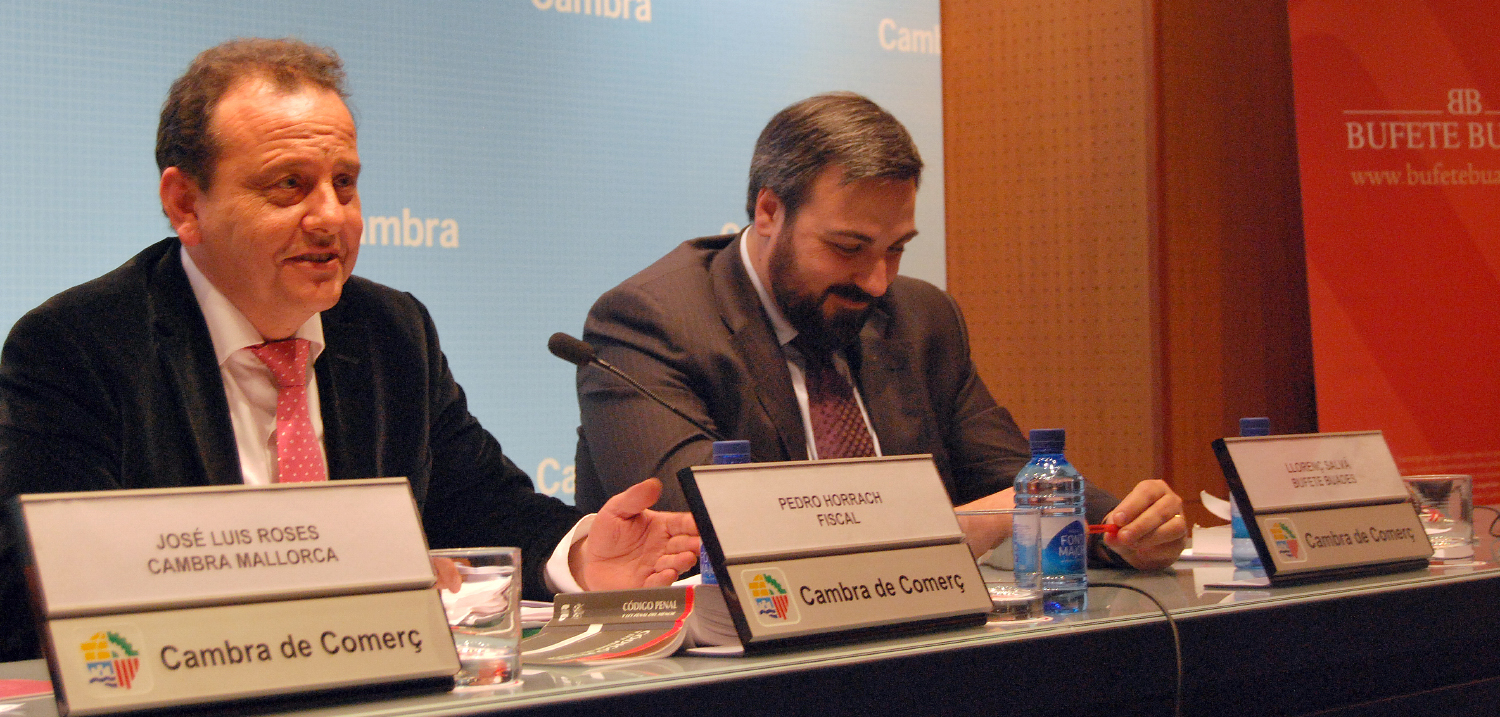
In his presentation, criminal lawyer Llorenç Salvà said, ‘Companies are not obliged to implement crime prevention programmes, but that doesn’t mean it isn’t a good idea to be more competitive with respect to corporate crime prevention, to avoid the subsequent negative legal consequences.’ Salvà went on to contradict the idea that numerous international judicial instruments are calling for a clear criminal justice response for legal persons, though regulatory moves are being made toward changing this, and he affirmed that evolving legislation on Compliance is inevitable.
Rewards for compliant companies
[roto lado=”right” texto=”Companies are not obliged to implement crime prevention programmes, but that doesn’t mean it isn’t a good idea to be more competitive with respect to corporate crime prevention” ]
Compliance programmes aim to prevent crimes being committed by natural persons. If a crime is committed in spite of all efforts to the contrary, the programme’s value will become apparent, allowing the company to exonerate itself from criminal accountability.
In this respect the Anti-Corruption Prosecutor said, ‘A regulatory compliance culture is not achieved by punishment alone. It is far more productive to reward companies that do comply with the current legal requirements, in the form of tax concessions, for example. Steps must be taken to promote a culture of respect for legal norms.’
Putting measures in place to prevent employees from committing crimes
Regarding the application of Compliance programmes, Mario Cepero, partner at RSM Spain, warned that 80% of small- and medium-sized companies in Spain are operating without a Compliance programme – an alarming figure in light of the fact that 97% of Spanish companies are small- and medium-sized.
Both Cepero and Julio Capilla, Managing Partner of RSM Spain, agreed that a single generic Compliance model is not possible. Each programme needs to be tailor-made according to company-specific risks which a generic model would neither detect nor mitigate.
The event was concluded with cocktails for all the attendees in the Chamber of Commerce’s facilities.
In media:
Cámara de Comercio de Mallorca
Bufete Buades gewinnt den Preis für die beste Marketingstrategie in den Legal Marcom 2016Bufete Buades nahm zum ersten Mal an einem landesweiten Wettbewerb teil, in dem die Kanzleien spanischer Anwälte ausgezeichnet werden: den Legal Marketing & Communications Awards (LMCA) 2016.
Die Legal Marketing & Communications Awards wurden geschaffen, um die Arbeit und die Bemühungen der Kanzleien anzuerkennen, sich durch Marketingstrategien und -aktionen und rechtliche Unternehmenskommunikation auf dem Markt zu positionieren und zu differenzieren. Dabei wird dem Marketing die Antriebsfunktion für den Start einer Kanzlei zuerkannt, das es in einem Land wie Spanien, mit der weltweit höchsten Rate von Rechtsanwälten pro Kopf, hat.
Stattgefunden hat die Preisverleihung am 25. Februar auf einer Gala im Palast Santa Coloma in Madrid. Dieses Jahr wurde der Marketingkampagne Nosquedalapalabra.es (Uns bleibt das Wort), entwickelt von unserer Kanzlei, der Preis „Beste rechtliche Marketingkampagneˮ verliehen.
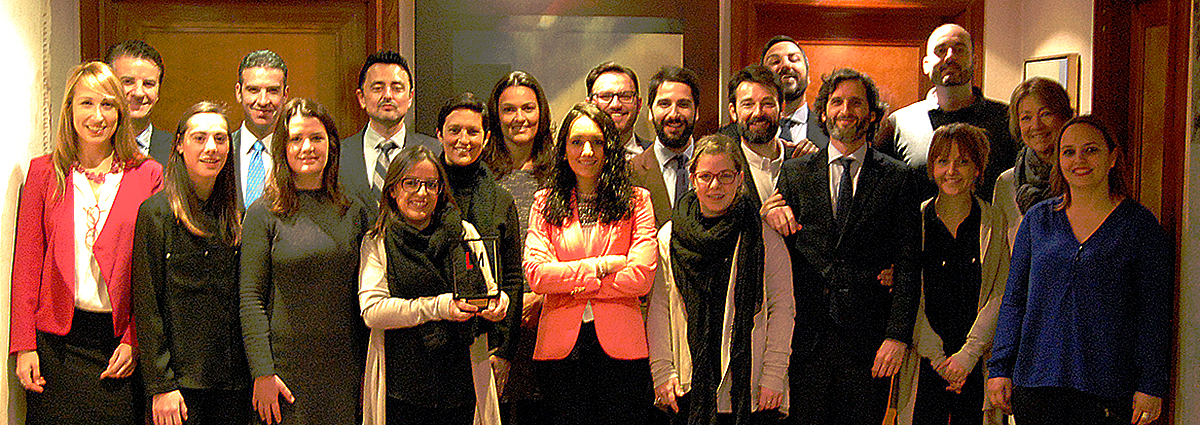
Hervorzuheben ist, dass in der Kategorie 2, in welcher Bufete Buades gewonnen hat, auch Kanzleien wie Arriaga Asociados oder Roca Junyent teilgenommen haben. Bei dieser Gelegenheit ging es darum, zum ersten Mal die Anstrengungen der Kanzleien zu würdigen, die traditionelle Unbeweglichkeit der juristischen Branche zu überwinden, die Sichtbarkeit des Berufsstandes zu verbessern, und sich auf dem Markt mit Marketingstrategien und -aktionen und Unternehmenskommunikation auf eine differenzierte Art zu positionieren.
Die außergewöhnliche Jury, die den Preis an die Vertreter des Bufetes Buades übergeben haben, war zusammengesetzt aus Vertretern von Firmen wie Garrigues, Deloitte, Latham & Watkins, Allen & Overy, Hogan Lovells, Norton Rose, Dentons oder Roca Junyent, Körperschaften wie die Spanische Rechtsanwaltskammer, die Rechtsanwaltskammern von Madrid und Barcelona sowie namhaften Rechtsanwälten von Kanzleien wie Cremades & Calvo-Sotelo, Ecix, Ceca Magán oder Luis Cazorla.
Auf der Gala sprach auch Ignacio Domínguez, Mitglied des Lenkungsausschusses der UNICEF. Organisiert wurde sie von Gericó Associates, die der UNICEF einen Teil der Erlöse aus der Veranstaltung spenden wird.
„Uns bleibt das Wort”, beste rechtliche Marketingkampagne
„Uns bleibt das Wort” ist eine vom Bufete Buades entwickelte rechtliche Marketingkampagne, in der es darum geht, Zitate von Denkern zusammenzutragen, die durch ihr Handeln, und vor allem durch ihre Ausdrucksweise, im Laufe der Jahrhunderte zum Fortschritt der Menschheit beigetragen haben.
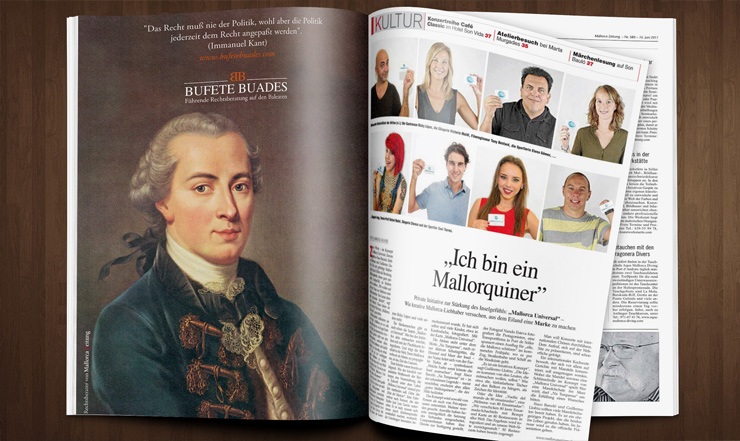
Bufete Buades, mit einer professionellen Entwicklung von über 35 Jahren, wollte damit die Macht des Wortes als wesentlichen Mechanismus des korrekten Zusammenlebens in einem Rechtsstaat hervorheben. Anfang 2015 wurde diese Kampagne gestartet. In ihr wird das Werk von Persönlichkeiten weitergegeben, die durch ihr Wort auf dem Gebiet des Rechts auch auf Fragen und Umstände in unserer heutigen Gesellschaft Antworten geben können.

Die Rechts- und Kommunikationsteams unserer Kanzlei wählten einige der wichtigsten Figuren der Weltgeschichte aus, deren Hinterlassenschaft die Werte des Dialogs und der Meinungsfreiheit als notwendige Elemente für den Fortschritt der Zivilisation hervorheben.
Für das Team unserer Kanzlei war es eine Ehre, diese Anerkennung zu erhalten. Der Preis ermutigt unser Team, weiterhin das Beste zu geben, durch die tägliche Arbeit und das Engagement für die Gesellschaft.
Berichterstattung über die Preisverleihung in den spanischen Medien [SPA]:
Diario de Mallorca – Business DMallorca
Miquel Roca: “Suicide is the major cause of death in under-35’s”Interview with Miquel Roca Bennasar, psychiatrist, professor and researcher at the Universidad de Illes Balears
Miquel Roca Bennasar is a psychiatrist, professor of Psychiatry in the Department of Psychology of the Universidad de les Illes Balears, Neuroscience Area Coordinator for the university’s Research Institute of Health Sciences (IUNICS), and Senior Researcher of the ‘Prevalent mental disorders in primary health care’ research group.
As author and editor, he has published ten volumes on psychopathology and psychopharmacology, and more than 85 articles in international journals. In this interview, Roca Bennasar explains the health issues that cause mental illness and talks about the major changes needed to bring about true progress in the field of psychiatry.
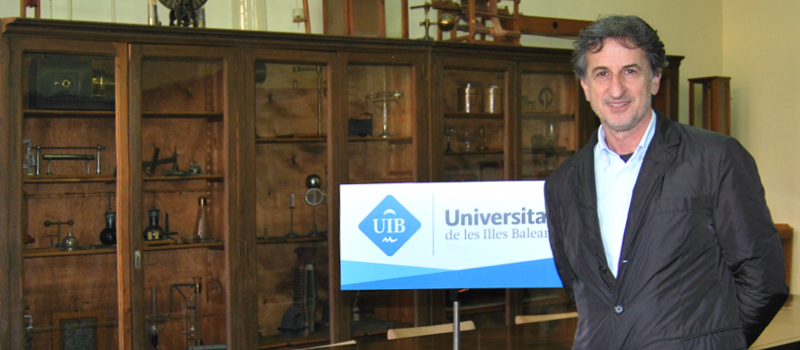
– Miquel Roca, how do you currently spend your professional time?
– It’s divided between lecturing, research and health care. Research on Spanish and international projects.
– In your long career, you have had dealings with Bufete Buades and, in particular, you have forged a close relationship with its director, Joan Buades. Which of these relationships is most important to you?
– Fortunately, in my life I haven’t found myself involved in any legal disputes requiring the firm’s services (laughter), but we have worked together with Real Mallorca and other sport-related leisure activities. Aside from that, I also enjoy totally personal relationships with members of the firm, with artistic and gastronomic tastes in common.
– In relation to the current crisis, what are the mental health issues most affecting the Spanish population?
– The mental health issues are the same as those before and after the crisis, but during the crisis they have become more acute. We are mainly talking about depressive and anxiety disorders, as well as those disorders that stem from the use of toxic substances. Those are the major disorders. The most prevalent are the depressive and anxiety disorders, which are very common in the general population, probably little recognised as such because there is still a stigma attached to them that makes people think they are illnesses that should be glossed over, concealed, disguised or kept from view, despite all the research demonstrating that the impact they have on the individual, the family, society and the economy is huge. For example, we are now seeing the repercussions of depression on daily function, which includes academic and work performance. In other words, there is a social, economic and collective impact on top of the suffering on a personal level.
– Is Mallorca any different with respect to these kinds of complaints or are its inhabitants, generally speaking, affected by the same kinds of illnesses as in the rest of Spain?
[roto lado=”left” texto=”During the crisis we have seen an increase of 7 – 10% on pre-crisis figures in consultations for mental disorders” ]
– Yes, fortunately there are no differences. The prevalence parameters for mental illnesses in the Balearic Islands are comparable with the rest of Europe. In fact, a number of myths exist, for example, the belief that Menorca is an island of frequent suicides. We have already published, researched and anlaysed this and it is not true. It’s a myth, but people insist that the notorious Tramuntana winds drive people to suicide, which is false. The rate of suicide, the gravest repercussion of a mental illness, is the greatest parapsychological issue facing the health care system. If you look at the under-35’s, the major cause of death is suicide. It used to be traffic accidents, but since those have reduced significantly, the major cause of deaths in the under-35’s today is suicide. The figures for the autonomous region of Menorca are similar to those for the rest of Spain. If we analyse the situation before and during the economic crisis, however, we can see the impact that mental health has had on primary health care consulations. During the crisis we have seen an increase of 7 – 10% on pre-crisis figures in consultations for mental disorders, and in care for people with mental disorders. Now we will repeat the same study in order to compare and contrast the three periods. What we have observed is that, during the crisis, mental health has had the most impact on primary health care consultations, since in a situation of economic crisis that is where the repercussions are produced. I think it will be necessary to implement significant changes to health care services if we intend to lessen the impact. The only preventative recommendations for these mental illnesses are that people take exercise, eat well and avoid toxic substances, though that continues to be complicated for young people.
– Are public resources sufficient to treat mental illnesses?
– All the research shows they are not, and they are not for many reasons, because mental health care doesn’t require a lot of technological resources. There are no great surgeons; psychiatrists work with the same instruments they have been using for two centuries. It is a question of personal listening and of time. It is inexpensive, yet mental illnesses continue to be those that have the most impact, individually, socially and collectively. When a person arrives at a hospital with a complaint that could indicate, say, a cardiac problem, doubtless they would be subjected to a series of examinations, tests, imaging tests and so on. By contrast, in psychiatry you have to give an immediate answer without access to any such resources. We play with a lot of subjectivity and very little objectivity in the diagnostic process. In our case, psychiatry has been taken out of psychiatric hospitals and put into general hospitals, and at the moment the aim is that patients who need to be hospitalised spend as little time as possible in hospital, returning to their families and society at the earliest opportunity. As a model, this is absolutely correct: no to psychiatric hospitals, better general hospitals with short stays and early return to community and family But the community and the family are in all-out crisis. There are times you have a patient who is hospitalised, you discharge them but they have no family in the area, the closest relative is many miles away, or they don’t have anybody at all. This is by no means to say that we should go back to the old model, this is the correct model, but it has many pitfalls because in the old days families were better able to look after a mentally ill person. The family model we have now is one with its members spread across the globe, and for a patient with, for example, bipolar disorder or schizophrenia, this can be very complicated.
[roto lado=”right” texto=”Psychiatry has been taken out of psychiatric hospitals and put into general hospitals, and at the moment the aim is that patients who need to be hospitalised spend as little time as possible in hospital”]
– You have published books and articles internationally, how do you see the role of psychiatry in the coming years?
– I think it will be defined as a medical speciality in which there is a lot of research which needs to be translational. In other words, all the research being accumulated on mental illness needs to be quickly translated into benefits for the patient. I believe that is the challenge for psychiatry. Right now we are still tied to research systems that only allow us to use new technology in research itself, and we need to take the step of applying that research to the clinic and our patients. It is complex, but progress is being made in pharmacogenetics and in more personalised medicine, where clinical research and epidemiological data are being combined with genetic and biological data in order that these can be translated into benefits for patients. In that sense, psychiatry has still got a considerable amount of fascinating work to do in order to improve.

A regenerative activity after a long, hard day’s work
Reading. Someone once said that reading any page of the Encylopaedia Britannica is a cure for any ill.
Your favourite typical Mallorcan dish and who made it best
Pa amb oli (bread with olive oil) and bread with sobrasada (cured pork sausage made with paprika). My mother used to make it, now I make it myself.
Palma has been voted the best city in the world to live in. The second best, in your opinion, is…
London. London is THE city, with that emphasis.
A drink your home can never be without
Red wine, naturally.
The image that best encapsulates happiness in your childhood
The sea in summer.
A historical figure you would have liked to meet and why
Michel de Montaigne in his castle at Bordeaux.
The quality you most admire in a person
It used to be intelligence, but now that I’m older it’s kindness and altruism. I’ve changed my mind on that.
Do you read the press in print or have you gone digital?
Both. Human life these days is reading the print version over breakfast with a coffee and reading tomorrow’s online version last thing at night.
Miquel Roca is never apart from…
Any book.

